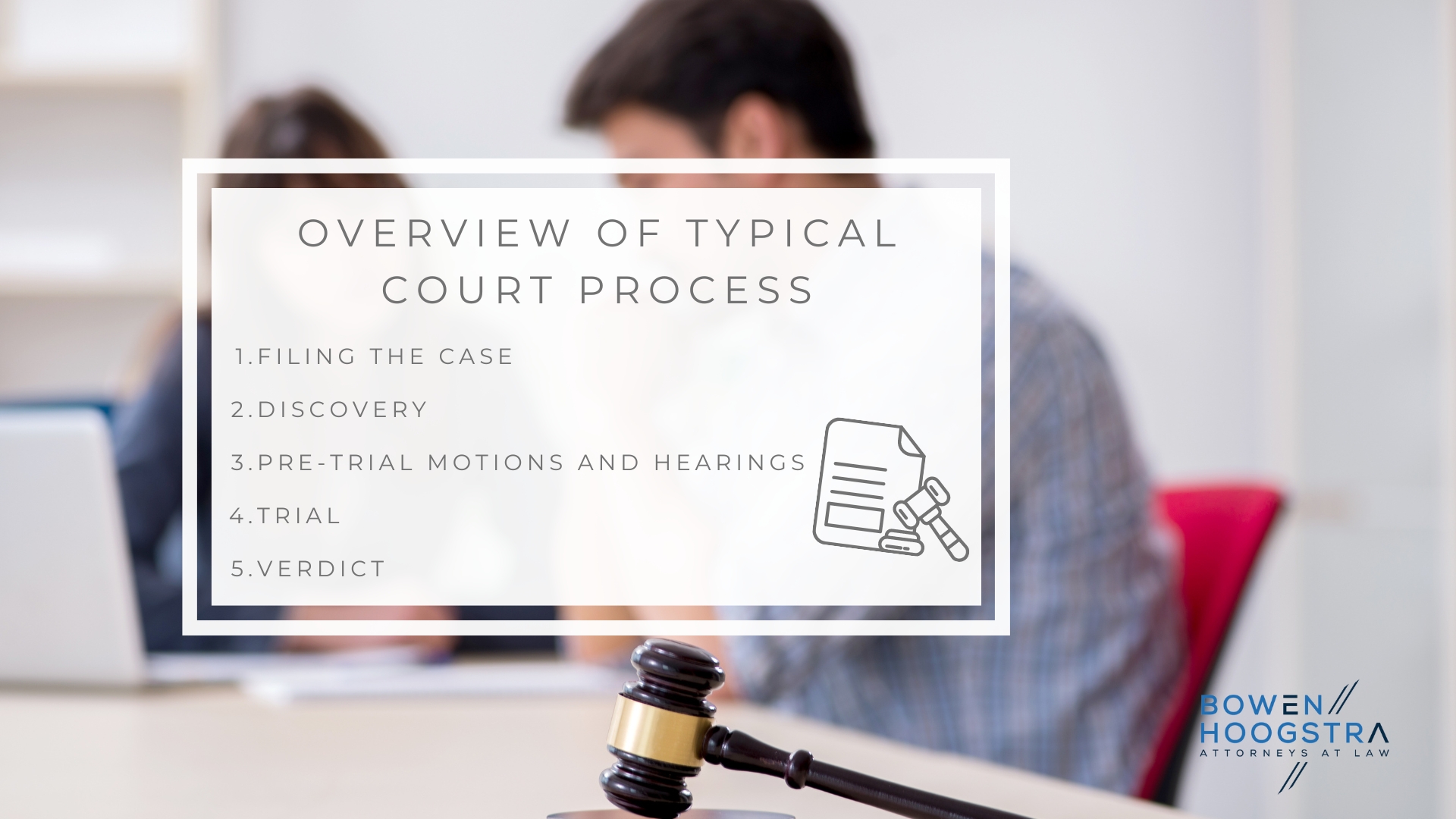Facing a day in court can be a nerve-wracking experience, especially if it’s your first time. But with the right preparation, you can feel more confident and in control. Let our seasoned Muskegon lawyer guide you through the process and provide tips to ensure you’re ready for your court appearance.
- Understanding the Court Process
- Gathering and Organizing Evidence
- Preparing Your Testimony and Statements
- Working with Your Muskegon Lawyer
Understanding the Court Process
Knowing what to expect can help reduce some of the anxiety associated with going to Muskegon court. Here’s an overview of how a typical civil case might proceed:
1. Filing the Case
The process begins when you or your civil litigation attorney file a legal complaint or petition that outlines your case and the relief you’re seeking from the court. Once filed, the court serves the other party, giving them a chance to respond.
2. Discovery
After the initial filing, both parties exchange information and gather evidence to build their cases, including interrogatories, document requests, and depositions. It’s essential to be thorough and honest during discovery to avoid surprises later.
3. Pre-Trial Motions and Hearings
Before the trial, there might be hearings on various motions, providing opportunities for both sides to ask the court to make decisions on particular issues, such as dismissing parts of the case or excluding certain evidence.
4. Trial
The trial is the main event of your day in court. It usually begins with opening statements from both sides, followed by the presentation of evidence and witness testimonies. After both parties have presented their cases, closing arguments are made.
5. Verdict
Once the trial concludes, the judge or jury deliberates and reaches a verdict. The decision can result in a judgment in favor of either party, potentially including financial compensation or other remedies.

Court proceedings often involve legal jargon. Here are a few key terms you might encounter:
- Plaintiff – the person who files the lawsuit
- Defendant – the person being sued or accused
- Judge – the official who presides over the court proceedings
- Jury – a group of citizens who evaluate the evidence and determine the verdict in some cases
- Lawyer – a legal professional who represents your interests in court
How Long Does Court Usually Last in a Day?
The length of a court day can vary depending on several factors, such as the type of case, the complexity of the legal issues, and the court’s schedule. Some trials might take an hour or less, while others can last several hours or even go into the next day. A local Muskegon lawyer can give you a better estimate based on the specifics of your case.
Gathering and Organizing Evidence
Evidence is the backbone of your case. It’s what supports your claims and helps the judge or jury decide in your favor. Depending on your case, you might need various types of evidence, such as:
- Documents – contracts, emails, medical records, and any other paperwork relevant to your case
- Witness Statements – testimonies from individuals who have firsthand knowledge of the facts
- Physical Evidence – any tangible items related to your case, including photographs, videos, or objects
- Expert Testimonies – insights from professionals who can provide specialized knowledge or opinions
Organizing your evidence is just as important as collecting it. Here are some tips to help you:
- Create an Inventory
List all your evidence and categorize it by date or type to help you quickly find what you need during your day in court.
- Label Everything
Clearly label all evidence with dates and descriptions, making it easier for you and your Muskegon lawyer to reference specific items.
- Prepare Summaries
Summarize evidence to highlight their importance. It can be helpful during presentations and arguments.
- Stay Consistent
Ensure that your evidence is consistent and supports your overall narrative. Inconsistencies can weaken your case and raise doubts.
The better organized and more comprehensive your evidence, the stronger your case will be.
Preparing Your Testimony and Statements
When it’s time to give your testimony in court, being well-prepared can make a significant difference. Be sure to review all the facts and details related to your case. Work closely with your Muskegon lawyer to understand what questions you might be asked and how to respond effectively.
It’s natural to feel nervous on your day in court. However, try to stay calm and composed during your testimony, even if the questioning becomes intense. Take deep breaths and deliver your responses in a clear and collected manner. Answer questions directly without adding unnecessary information.
Working with Your Muskegon Lawyer
A successful day in court hinges on a positive attorney-client relationship. And it starts with open and honest communication with your Muskegon lawyer. Feel free to ask questions if something is unclear. Your lawyer is there to guide you through the process.
On your end, be prepared to share everything relevant to your case, including documents, photos, and other evidence, even seemingly insignificant details. Your lawyer needs the full picture to build a compelling case and develop a winning strategy.
If you’re looking for experienced and dedicated legal representation, Bowen Hoogstra Law is ready to assist you. Our competent Muskegon lawyers are here to listen to your concerns, answer your questions, and provide you with the expert legal advice you need.
From the initial consultation to your day in court, we are committed to supporting you every step of the way. Contact us today at (231) 726-4484 or here to schedule a consultation, and let us help you achieve the best possible outcome for your case.

